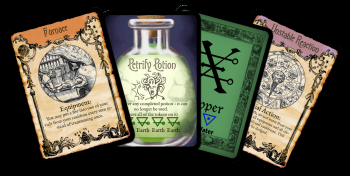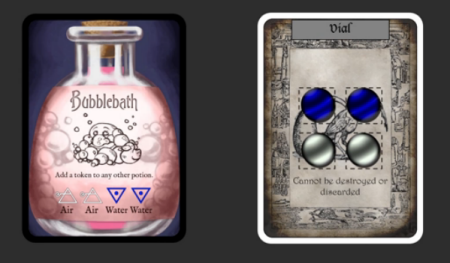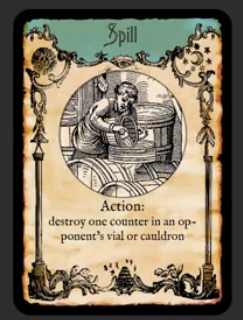It wasn’t his fault that the lab was on fire. Well, OK, the transmutation circle had been smudged in exactly the wrong spot…
And the homunculus helping him draw it had suddenly been reduced to its component elements three hours ago…
And the antimony had not been properly weighed…
And that the wish potion he was attempted to create was actually three steps more complex than his plan has shown…
Still, everything should have worked regardless, even in spite of all of these setbacks. The path to being a master alchemist was about such purification by trial. Even if it hadn’t worked, nothing should have led to the lab suddenly catching on fire. It wasn’t his fault at all…
It was yours.
Never underestimate the power of a well-timed arson in sabotaging your rivals.
Such it is in Alchemy!, the debut product of Aviary Games. In Alchemy!, three to five players take on the roles of apprentice alchemists sharing a lab. Each apprentice is competing to prove themselves the most worthy of their master’s tutelage by creating powerful and difficult potions. These apprentices must balance the fine art of mastering alchemy with disrupting their opponents’ plans. Whatever it takes to get ahead really.

Prototype Shown
The goal of Alchemy! is to be the player with the most tokens on successfully created Potions at the end of the game. Players create potions by transmuting ingredients into elements and using those elements to generate the proper concoctions needed to create an available Potion.
The game begins by revealing twice as many Potions as there are players. Potions require either three or four specific Elements to be created, and each one has its own special abilities that can be be used once crafted. All players start with one Crucible and one Vial to work with, as well as a hand of cards that provide them with either Actions or Equipment.
At the start of each player’s turn, they draw two Alchemy! cards and reveal Component cards until there are four in play. They may then Transmute one Component, pour one Element from their Crucible to their Vial, and, if possible, create a Potion.
Transmuting is simply removing one of the available Components from play and adding the two listed Elements (Earth, Air, Water, or Fire) on that card to their Crucible. Pouring consists of moving one Element of their choice from their Crucible to their Vial. This is an important choice, as once an Element has been added to a Vial, it cannot be removed without emptying the entire Vial (which can be done any time during a player’s turn for free).
Creating the Potion, naturally, is the tricky part. When creating a Potion, a player must exactly match the Elements of that Potion with the Elements in their Vial. Like this:

Prototype Shown
They then claim the Potion, transferring their Elements to the Potion as tokens. These tokens serve as both victory points at the end of the game and a number of uses the Potion has.

“Whoops. Seems like you spilled something!”
Prototype Shown
Additionally, player may play Alchemy! cards from their hand. There are three types of Alchemy! cards: Actions, Equipment, and Special. Players may play one Equipment card and one Action card any time on their turn. (Special cards can be played on any turn, and do not require an action to perform.)
Equipment cards remain in play and provide you special bonus abilities, but you’re only allowed one piece of Equipment at a time. Playing a new one will remove the old one. Action cards afford you a number of temporary benefits, such as transmuting a second Component, pouring an extra Element, or, as it quickly becomes apparent, interfering with your opponents.
This makes sense. Alchemy! is, after all, about competition. Action cards can deny another player Actions, spill their Vials, and swap Elements in their Cauldron, just to name a few. Completed Potions also give you the ability to interfere with your opponents, if you so choose. However, as powerful as Potions are, each activation reduces your potential final score by one.
Players continue taking turns attempting to craft Potions – and stymieing other players – until the last Potion is claimed. At that point, the player with the most tokens on their Potions being the undisputed alchemist in the room.
Alchemy! proves to be a well thought out game that is easy to learn and should appeal to a number of different audiences. With all its various moving parts in the form of Alchemy! cards, different Potions, various Components, and above all, the actions of your opponents, it’s quite difficult to chart a course to victory without someone interfering with your actions. It possesses that screw-your-neighbor play style similar to other light card games, such as Munchkin, but while it does have a few tongue-in-cheek aspects, Alchemy! doesn’t go into full-on satire. For the more aggressive style players, there is plenty here to obstruct the careful deliberations of their opponents in amusingly thematic ways.
What’s more, Alchemy! also avoids being too random or too complex, striking a nice balance that is ideal for social gatherings where people are seeking something above your standard party game fare but shy of games that require a lot of time or effort to commit to. (Most Alchemy games are over in less than 45 minutes.) As a result, this game can equally cater to the social gaming crowd and to those seeking some light competitive strategy.

So much alchemy, so little time…
Prototype Shown
Alchemy has been a popular subject for games lately, spawning deck builders, worker placements, and more. Alchemy! separates itself by mixing its ease of play with the right dash of humor. In many ways, Alchemy! combines the complexity of careful resource allocation with the fun of making your friend spill their drink, while having a good degree of theme and variety. Does all that make Alchemy! into your kind of gold? Decide for yourself over on their Kickstarter!
